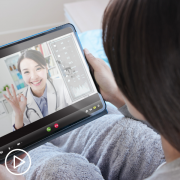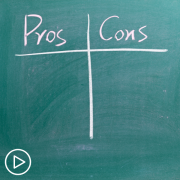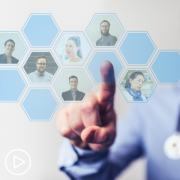Lung Cancer Advocate Shares How to Optimize Your Telemedicine Visit
Lung Cancer Advocate Shares How to Optimize Your Telemedicine Visit from Patient Empowerment Network on Vimeo.
How can lung cancer patients optimize their telemedicine visits? Watch as lung cancer patient Jill shares her top tips for how to prepare for virtual visits and how to advocate for yourself when communicating for optimal care.
See More From Lung Cancer TelemEDucation
Related Programs:

|

|

Lung Cancer Patient Shares Why Telemedicine Should Be a Long-Term Tool
|
Transcript:
Jill:
One thing that someone else recently mentioned to me is to be patient with the doctor who might be late, and I don’t mind actually, the doctor’s late or early. I’ve had a doctor be up to half an hour early or up to an hour late, and that doesn’t bother me, I just go on living life and doing other things while I wait for the call, but I do book a bigger chunk of time on my calendar with the expectation that doctors are really busy people and they can’t always predict how long something else will go or what would come up, so it’s good to be understanding about it for sure.
It’s also helpful for me and a lot of people to write a list of questions, symptoms, and make sure that you get them all answered, so write them down and actually check them off, or cross them off while you’re in the appointment, because you don’t wanna walk away from there thinking, oh shoot, there was that one big question I had and some doctors are okay with getting an email or something between appointments, and some nurses are great to call, but not everyone has that opportunity.
So, I would say, make the most of your appointment just like you would in-person. Take good care to make sure that you’re advocating for yourself, and if the doctor says words after you ask your cost your question, you don’t feel like you understood them. Don’t be embarrassed or afraid or anything… just ask again, ask for clarification. Sometimes these doctors talk in big words, and my doctor has been great, my oncologist he would like draw pictures and I ask him often to write words down for me if I don’t know how to spell them because why would I know how to spell that? I don’t have a medical and oncology degree, so there’s no shame in asking questions, asking questions is smart, and it helps make us better informed, and it’s true that a better informed and a better-informed patient is a more empowered patient, and we tend to have better outcomes, when we know what’s going on in our treatment, so take the time to ask your questions.
_____________________________________________________________________________



